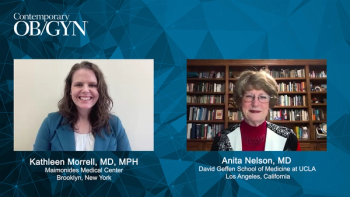
An expert discusses how elinzanetant demonstrated favorable body composition changes including weight loss, decreased fat mass index, and increased lean mass index in postmenopausal women.

An expert discusses how elinzanetant demonstrated favorable body composition changes including weight loss, decreased fat mass index, and increased lean mass index in postmenopausal women.

An expert discusses how elinzanetant showed less bone mineral density decrease, reduced bone turnover markers, and increased total body bone density compared to placebo, suggesting beneficial skeletal effects.

Panelists discuss how effective screening goes beyond formal tools like the Edinburgh Postnatal Depression Scale to include genuine patient connection, direct questioning about emotional well-being, and clinical observation, while emphasizing the important role pediatricians can play in identifying maternal mental health concerns during frequent baby visits.

Panelists discuss how reproductive psychiatry is an evolving subspecialty that requires collaboration between obstetricians, primary care providers, and psychiatrists, with clear guidelines for when to refer patients (such as those with bipolar history, psychosis, or treatment resistance) while building capacity for basic screening and treatment in obstetric settings.

Panelists discuss how progestins have evolved from early norethindrone compounds through more potent but androgenic levonorgestrel to newer options such as drospirenone and dienogest, each offering different benefits for cycle control, noncontraceptive effects, and adverse effect profiles.

Panelists discuss how most combined hormonal contraceptives contain ethinyl estradiol for its long half-life and cycle control benefits, while newer natural estrogens such as estradiol and estetrol offer different tissue selectivity and potentially reduced liver impacts.

A new FDA-submitted self-collection HPV test aims to improve cervical cancer screening access for underserved women by offering a convenient, noninvasive at-home option.

An expert discusses how the OASIS-3 trial was designed as a 52-week placebo-controlled study in postmenopausal women with moderate to severe vasomotor symptoms, including experimental bone health end points.

An expert discusses how neurokinin receptor antagonists like fezolinetant (NK3) and elinzanetant (NK1/NK3) work in the hypothalamus to reduce vasomotor symptoms, with elinzanetant showing promising skeletal benefits.

Panelists discuss how certain patients require closer monitoring, including those with previous mental health histories, recent losses, childhood trauma, or abrupt medication cessation, while emphasizing the importance of continuing necessary psychiatric medications during pregnancy and lactation through proper risk-benefit discussions.

Panelists discuss how untreated perinatal mood disorders create cascading effects that impact breastfeeding, partner relationships, and child development, and can lead to adverse childhood experiences with long-term consequences for both mothers and children across generations.

Panelists discuss how younger women (18-24) most commonly use condoms and oral contraceptive pills due to factors like less frequent sex, dual protection needs, and access issues, while emphasizing that individual preferences matter more than age when counseling patients.

Panelists discuss how combined hormonal contraceptives come in three main forms (pills, patches, and rings) and provide a comprehensive overview of all available contraceptive methods including long-acting reversible contraceptives, barrier methods, and emergency contraception.

In the wake of tightening abortion laws, telemedicine and advance provision of abortion pills are emerging as essential, safe, and accessible solutions for reproductive health care.

Jessica Shepherd, MD, MBA, outlines current cervical cancer screening recommendations, the potential role of HPV self-collection, and strategies to improve patient understanding and access to care.

An expert discusses how estrogen remains the most effective treatment for vasomotor symptoms while also benefiting bone density, though alternative treatments like paroxetine and fezolinetant lack bone health benefits.

An expert discusses how menopause triggers increased bone remodeling with imbalanced resorption exceeding formation, leading to progressive bone loss and potential osteoporosis that requires careful attention to optimize bone health.

Panelists discuss how perinatal mood and anxiety disorders can occur throughout pregnancy and postpartum periods, with symptoms varying based on timing and requiring differentiation from other conditions like obsessive-compulsive disorder, posttraumatic stress disorder, and panic disorder through careful assessment of presenting symptoms.

Panelists discuss how postpartum depression differs from the normative “baby blues” experience, with postpartum depression being more persistent, severe, and functionally impairing compared with the temporary emotional fluctuations of baby blues that resolve within 2 weeks.

Learn the truth about estrogen therapy, including its safety, benefits, and the critical differences between local and systemic hormone treatments.

New research reveals that existing USPSTF guidelines may overgeneralize preeclampsia risk, highlighting the need for biologically based, personalized screening methods to improve maternal outcomes.

A 28-day low FODMAP diet significantly reduces gastrointestinal symptoms and improves quality of life in women with endometriosis.

Getting a flu shot while pregnant significantly reduces the risk of severe illness for the mother and cuts the infant’s flu risk by 44% during the first 6 months of life.

Discover the serious health risks of smoking while pregnant, how vaping compares, and the most effective ways clinicians can help women quit.

A panelist emphasizes that the OASIS 4 findings, with those of prior OASIS studies, strongly support the use of this drug class for managing vasomotor symptoms (VMS) in patients with breast cancer receiving endocrine therapy and highlights the need for future research in underserved populations such as men with breast cancer and those with metastatic disease.

A panelist explains that although liver function was closely monitored due to potential concerns about the investigational therapy and concurrent endocrine treatments, no serious hepatotoxicity was observed during the trial. However, continued monitoring in longer-term and real-world settings remains important to confirm the treatment’s liver safety profile.

A panelist notes that although the treatment was generally well tolerated—with fatigue, somnolence, and diarrhea being the most common adverse effects—long-term data on breast cancer outcomes such as recurrence and survival are still lacking, underscoring the need for extended follow-up and real-world evidence to fully assess long-term safety and efficacy.

A panelist emphasizes that effectively managing endocrine therapy adverse effects—particularly vasomotor symptoms—can significantly improve treatment adherence, which is critical for reducing recurrence risk and improving survival in patients with breast cancer.

A panelist shares that secondary results from the trial showed early and sustained improvements in sleep and quality of life, underscoring the therapy’s potential to enhance endocrine treatment adherence by alleviating vasomotor symptoms (VMS) that often lead to poor adherence in patients with breast cancer.

The American Medical Association urges plant-based diets, exercise, and reduced alcohol to lower breast cancer risk and address racial disparities.